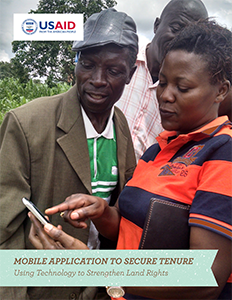Around the world, millions of people lack documented land rights. This may be the result of weak land governance systems or limited capacity to provide accessible and accountable land administration services. These institutional challenges are widespread and drive costly and systemic problems on the ground.
Without documentation, people often lack secure tenure over land and natural resources. They are more vulnerable to wrongful displacements that disrupt their livelihoods and important social networks. They also have fewer incentives to invest labor and capital to improve productivity and enhance the future value of their land. For too many, tenure insecurity means that agricultural productivity and incomes remain low; resources are used in unsustainable ways; and, costly conflicts are all-too common. Additionally, poor land governance creates special hardships for women and other vulnerable groups.
USAID is addressing these problems through an innovative pilot called the Mobile Applications to Secure Tenure (MAST) project. The project team has developed an easy-to-use, open-source smartphone application that can capture the information needed to issue formal documentation of land rights. Coupled with a cloud-based data management system to store geospatial and demographic information, the project is designed to lower costs and time involved in registering land rights and, importantly, to make the process more transparent and accessible to local people.


 Download the Mobile Application to Secure Tenure (MAST) Brochure.
Download the Mobile Application to Secure Tenure (MAST) Brochure.